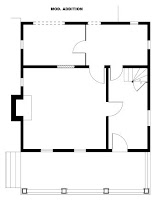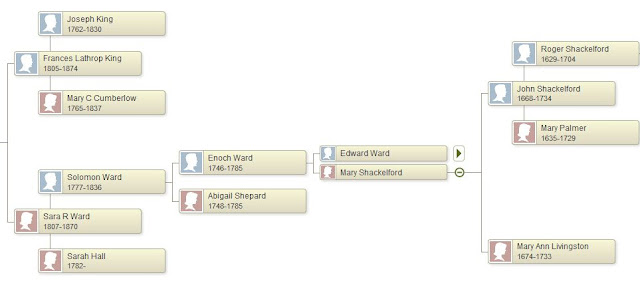From:
Early Domestic Architecture in Beaufort, North Carolina - Summer Field
Study 2011 - College of William and Mary & Colonial Williamsburg
Foundation Dept. of Architectural and Archaeological Research (Klee and
Lounsbury) - Field-study drawings and photographs are by Jeffrey Klee, Carl Lounsbury and Field School participants.
Click images to enlarge.



 Located at 204 Live Oak Street, the Joseph King House sits at the eastern edge of Beaufort’s historic town plan. The house is a one-and-a-half story timber framed building that has preserved its original plan. Though it has undergone some renovations and additions, many of its original features survive. The original building measures 24 feet 4 inches in length and depth. Its plan features a side passage with a winding staircase and doors that lead to the large, heated front room and smaller back room now used as a dining room. From the back, another door leads to the present kitchen which was an unheated room behind the front room. A modern addition was made at the rear of the house.
Located at 204 Live Oak Street, the Joseph King House sits at the eastern edge of Beaufort’s historic town plan. The house is a one-and-a-half story timber framed building that has preserved its original plan. Though it has undergone some renovations and additions, many of its original features survive. The original building measures 24 feet 4 inches in length and depth. Its plan features a side passage with a winding staircase and doors that lead to the large, heated front room and smaller back room now used as a dining room. From the back, another door leads to the present kitchen which was an unheated room behind the front room. A modern addition was made at the rear of the house. The land on which Joseph King House sits was deeded in 1789, but physical evidence suggests that the present dwelling was built around the first quarter of the nineteenth century. The original rafters are a combination of pit sawn and sash sawn. The square-butt roof shingles, 24 inches long, are secured to the porch rafters by mature cut nails, suggesting that the porch was not original but part of a later addition. The first floor ceiling is part of a modern rebuild and the chimney and kitchen door have also been rebuilt.
The current kitchen has several features worth noting. Lying below the ceiling, the exposed joists were clearly reused as decoration, and the presence of nail holes and ghost marks from lath work further proves that they are reset. A doorway has been cut through the wall forming the boundary between the kitchen and dining room. The kitchen was once accessible from the front room as there is evidence of a blocked door in the base and other trim.
The Joseph King House has retained much of its original character. In addition to the moldings, mantel, and much of the original plan, the staircase and second-floor balustrade, all accessible from the side passage, have been preserved. While architectural evidence suggests a date perhaps 50 years later than the 1783 marked on its plaque, the Joseph King house is fine example of a house form that became prevalent during the boom years of the early nineteenth century.
Family History
 |
| Francis L. King and wife Sara Ward Scanned from Beaufort's Old Burying Ground North Carolina Hardy, Wilson and Collins |
According to family history, Joseph King (1762-1830) was born in 1762 in Portugal/Spain area. He married Mary Catherine Cumberlow (1765-1837) November 6, 1799 in Carteret County. They had one son, Francis Lathrop King (1805-1874), born October 10, 1805 in Edenton, Chowan County, NC. King died 2 September 1830. In 1825 Francis Lathrop King married Sara R. Ward (1808-1880).
Sarah R. Ward (1807-1870) was the daughter of Solomon Ward (1777-1836) and Sarah Hall. Sarah's g-grandfather Edward Ward (1661-1712), father of Enoch, married Mary Shackelford, daughter of John Shackelford (1668-1734) and Mary Ann Livingston. (See King Family Tree below.)
In A Story of North Carolina’s Historic Beaufort, Mamré Marsh Wilson wrote, “Francis Lathrop King, the only child of Joseph and Mary Catherine Cumberlowe, was born in the early 1800's in Edenton, North Carolina. Prior to moving back to Beaufort in 1819, he attended New York's Bellevue Hospital for physician's training and received his diploma. After settling back in Beaufort, he began his practice as well as a drugstore on Front Street. He married a local Beaufort girl, Sara R. Ward, and they had ten children, two of whom followed in their father's footsteps, becoming physicians. One practiced at Bellevue Hospital in New York, while the other was a well-known and beloved doctor in Wilmington, North Carolina.”
Beaufort’s Old Burying Ground: North Carolina, stated, “Legend* has it that Joseph King was really Antoine Joaquin Sousa, a small boy who was kidnapped and stowed away in a ship harbored in Portugal that eventually landed in Beaufort. Many King family members are buried in this plot…descendants still live in Carteret County today. One family buried here is Dr. Francis King and his wife Sara Ward.”
1790 Carteret County Census: Joseph King - Four in household, including one slave.
A February 1795 court record – Deed of sale from Joseph King and Elizabeth his wife to Joseph Fulford for fifty acres of land near Beaufort proved by the oath of Dederick Gibble and ordered to be registered. Since Joseph King married Mary Catherine Cumberlow (1765-1837) November 6, 1799 in Carteret County, could this have been his second wife, or was there another Joseph King in the area about the same time?
-1800 New Bern, Craven County: Joseph King
-1820 Beaufort Census: Joseph King - Three free white persons in household.
-1830 Beaufort Census; Francis King – 11 persons in household including 6 slaves
-1850 Slave Record for Francis L. King: Ten slaves ranging in age from 70 to 2.
-1860 Beaufort Census: M.D. F.L. King 56, Sarah 52, Lavinia 19 and Mary 16.
-1860 Beaufort NC Slave Record: F.L. King - 10 slaves
-1870 Beaufort Census: hotel keeper William King 45, Sarah 37, Kenneth 20, William 15, Mary 8, Charles 5, Sarah 10mo., doctor Francis 64, Sarah 62.
Children of Francis L. King and Sarah Ward King: William Charles King (1825-1877) married Sallie Ann Roberson, Anna King (1827-) married Thomas P. Ricaude, Joanna C. King (1829-), born in Hyde County, married Benners Alexander Ensley, Joseph Francis King (1832-1879) married Maria Theresa Dixon, Sarah Jane King (1833-1889) married LaFayette Washington Martin, John Frederick King (abt 1835-) married Virginia Carolina Taylor, Edward De La Rosa King (1837-), Margarette King (1839), Lavinia King (1841-), Mary King (1843-)
Marker: Old Burying Ground, Beaufort, Carteret County, NC
Frances L. King M.D.
Born Oct 10, 1805
Died Nov 4, 1874
"Mark the perfect man and
Behold the upright for the end
of that man in peace."
............................................................
*Origin of the name King in Carteret County North Carolina
Story posted on ancestry.com
by Lulu W Bobbitt
Paraphrased for clarity and brevity:
The legend, as passed down through the King family: About 1765, Joaquin Sousa, then a three-year-old boy, was on the shore of Portugal with his nursemaid. The boy and his nursemaid chatted with sailors as their ship was about to set sail for America. One of the sailors evidently became infatuated with the child and hid him on the boat as it pulled anchor. As may have happened, when asked by the ship’s mate what his name was, “Jo-a-Quin,” he answered. “Oh yes, Jo King,” said the mate and they called him Joe King.
According to family legend, Joaquin was wearing a red velvet suit with a gold embroidered crest when he was kidnapped on the shores of Portugal. The suit was burned in the home of his son, Dr. Francis Lothrop King (1805-1874), during the Civil War.
 |
| King Family Tree - Ancestry.com |


